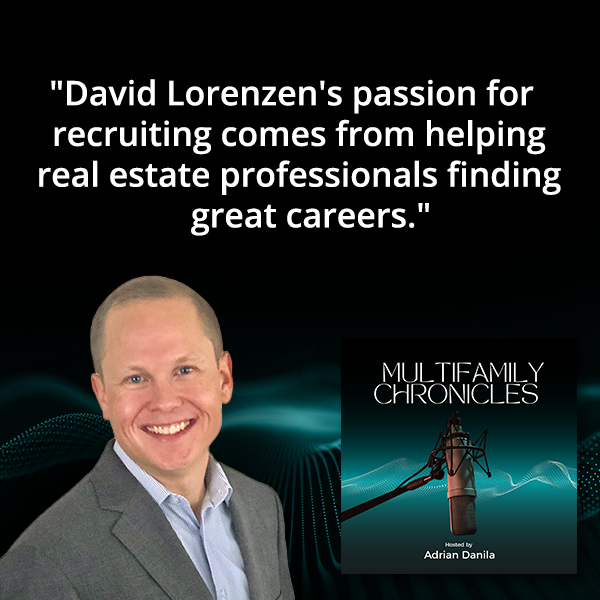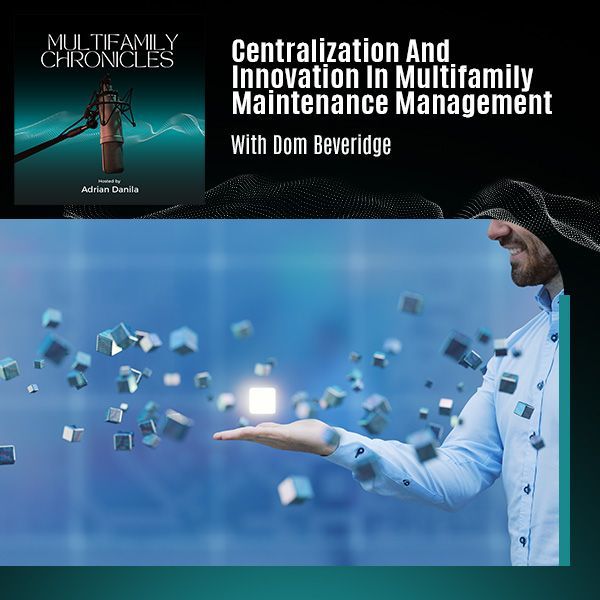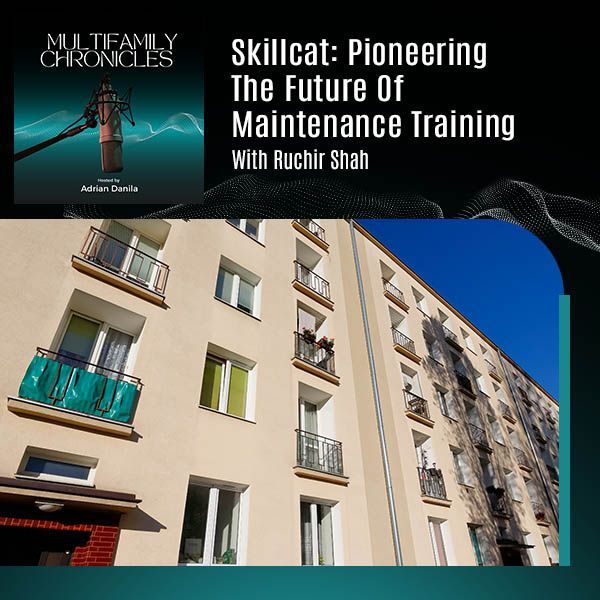Overcoming Challenges in Real Estate Recruiting with David Lorenzen
With all the emphasis on properties, at the end of the day, real estate is all about people. They are the very core that drives you and your business to success in the industry. That is why recruiting the right candidates to support you is very crucial. David Lorenzen, the Senior Vice President of Southcoast Partners, has been successfully matching ideal candidates for those in the real estate industry since 2014. In this episode, he joins Adrian Danila to discuss what led him to pick a career in recruiting and how he sees real estate could benefit from recruiting better. David then shares his take on the challenges we’re facing today, specifically the great resignation, and what he thinks we should do to solve them. Full of great insights on hiring, pursuing career growth, and the job market, this conversation will surely serve you to level up your real estate game.
---
Watch the episode here
Listen to the podcast here
Overcoming Challenges in Real Estate Recruiting with David Lorenzen
Our guest is David Lorenzen. David is Vice President of Real Estate at Southcoast Partners. Welcome to the show, David.
Thank you. It's an honor to be here.
Please introduce yourself to the audience. Tell us a little bit about your professional and personal background, and some great things that you do at Southcoast Partners.
I am a native Texan. I am a pure-blood Texan. My family is all made up of Aggies and Longhorns. I decided to go to the University of Houston. I'm from Houston. I still live in the Houston area. I moved to Houston in 2003 from Waco. I graduated with a Finance degree. When I graduated in 2007 or 2008 with this Finance degree, my whole plan was to be a financial advisor. In 2004, 2005, and 2006, it sounded like a good idea when the economy was going great seemingly. The economy then collapsed in 2008, and that whole plan of being a financial advisor went out the window.
I decided to go to Enterprise Rent-A-Car and went through the whole trajectory. There are a lot of similarities between Enterprise and the rental industry in dealing with people, managing teams, and the sales side of it. At one time, in 2012, I was working at the InterContinental airport. We worked every day. We worked during Thanksgiving and Christmas. We worked until 2:00 AM, and then the next day, you may be working at 6:00 AM. That took a toll on my family and me.

I decided to join a recruiting firm. In 2012, one of the people that I worked with Enterprise had gone over to a recruiting firm called Addison Group. They’re an international recruiting firm. I joined the healthcare industry first, so I started recruiting in the healthcare industry. We did back office for business folks like collections, coding, and things like that.
At that time, in 2012, the unemployment rate was 8%. It was a completely different time. It was not a candidate-driven market. It was an employee-driven market. It was interesting. However, I was also driving across Houston, which took an hour and a half one way. I was living on the north side of Houston and Southcoast Partners is on the north side in Kingwood. I decided to make this change and join real estate.
Number one, I liked the idea of real estate, and number two, Southcoast Partners was founded in 1993. It has been around for a long time. A lot of people there have been around for a long time. I decided to make the change in multifamily specifically. Southcoast Partners started out in commercial real estate, working with office, retail, and those type of folks. They switched to multifamily when it started taking off in the 2000s. They had been doing multifamily since then in the late ‘90s until the 2000s.
In 2014, I started with Southcoast Partners and have been working in the real estate industry since then. We focus on executive-type roles or direct hire-type roles. We don't do any temporary staffing. Most of the time, it is the maintenance supervisors, regional maintenance folks, regional construction project manager folks, property managers, regional property managers, and asset management. We also work with real estate developers and do a lot of those types of roles throughout the country. We work with companies in Florida, California, Seattle, DC, Chicago, and Arizona. We are all over the place. I love it. I love what I do. It's been a pleasure.
I'm curious. How did you decide on picking recruiting as a career? You told me the history and everything, but why recruiting specifically? It's a pretty significant shift from what you were preparing to become versus what you have embraced as a career.
I wanted to be a financial advisor initially to help people with their finances. My dad is a pediatrician. He's a doctor, but he doesn't know anything about finances. I wanted to get in and be able to help people like that with their finances. This way, recruiting is helping people get jobs. Help companies and people hire better talent.
I get the opportunity to help people all day long. That's one of the main things that I enjoy. In the real estate industry, the people are great. I love the people in the real estate industry, especially multifamily. They have hearts of gold. Helping people like that has kept me in it. I got into it to help people, and I continue to be into it to help people.
We're talking about eight years later.
I've been in recruiting since 2012.
That's an excellent run. Everybody talks about the Great Resignation. It's a label for everything that's happening in the world with the labor force. Many things that happened were developed since COVID. For the past couple of years, there have been significant shifts. I'm a close observer of what's happening in the multifamily field, particularly in the recruiting field.
There is poor maintenance, specifically. I'm seeing how the market shifts every 2 or 3 months. Candidates’ behaviors are different. Their preferences change not radically, but they do change some. I also know that the corporate industry in general, like corporate America, is harder to keep up with the times. They're trying to catch up. There's always a gap out there between what the candidates wish for in an offer and what employers have to offer at the time.
With that being said, I'd like you to walk me through your experience. How do you see the Great Resignation with so many people being out there and willing to switch jobs or companies, leave their current job, and go work somewhere else? Where do you see this going? How do you see solutions for it from an executive recruiter standpoint or from your experience working with clients?
If I was president of the Great Resignation, what would I do? The job market has been a candidate-driven market for a while. Unemployment was under 4% in 2018 and 2019 also. That is even before the COVID pandemic. Employers were struggling to find great candidates. There were plenty of open jobs even before the pandemic.

Since the pandemic, many things have changed. People and companies found out that they could work from home. Some of them do it successfully and efficiently. That has changed a lot of the job duties and the job responsibilities of people. A lot of people have a hard time. If they were doing it from home successfully and efficiently, why should they have to go back into the office and do it now? We have to answer that question.
At the same time, people also found out that some people don't like working from home. Not everybody does like working from home. They miss being at the office or being around people. They want that environment. That's changed a whole lot since the pandemic. People are also now more attuned to what the benefits of the company are. What are the health benefits? What are the paid time-off benefits? If you have COVID or the flu or you get a serious illness and have to take a week off, how does that affect your PTO time for the year? Those are questions that we didn't have to get answers to before. It was salary, bonuses, and what these things are.
Now, when the salary is a little bit off, people aren't going to make a change for $10,000 more. They're going to say, “What are the health benefits?” Sometimes, those healthcare costs have increased too. If you have to pay more every month in healthcare or five times more in healthcare for your family every month, then that little bump in pay salary isn't as significant. Those are the main things that have changed.
I'm wondering if we're going to stay in a tight market as far as unemployment rates. The jobs report came out and it was 3.6% unemployment.
It’s an interesting time. I also think COVID has changed a lot of the employment structure. There is also the fact that our population has gotten older. It's a fact. The median age is 38 years old or even older. The median age in the ‘60s and ‘70s was 29 or 30. We have an older population.
A lot of those people decided that they were going to retire. They could move from a higher cost of living to a lower cost of living, which a lot of them did. A lot of them sold their homes and moved to Florida, Arizona, or these high-growth cities like North Carolina, Boise, and Idaho. If they were able to sell their home for a bigger revenue in the last 2 or 3 years and move to a lower cost of living, then they decided to do that and retire. That has a lot to do with it, but there are many factors that have gone into this Great Resignation. People have a little bit more courage in changing jobs because there are so many jobs and good jobs available. I hope that answered your question.
People have a little bit more courage in changing jobs right now because there are so many good jobs available.
It did. I wanted to get your take on what's happening globally. You painted a pretty good picture of what's happening out there from what you're seeing.
There are companies that are winning this employment situation. The companies that are adaptable are the ones that are winning. The ones that give the better benefits and are adaptable are getting those employees. Some of these big national companies, as soon as the gas prices started going up, started giving all of their employees gas cards or monthly gas allowance that they weren't doing before.
The companies that are adapting and doing things like adding to their benefits, seeing their employees on-site that are struggling, and seeing how they can help and add benefits to help them are the ones that are winning. The multifamily industry, specifically, is a very small industry. When one person says, “My company is giving a gas card,” and the other company is not doing that, they're like, “Do you have any job openings? I want to go work for that company.” I see that a lot.
You’re ringing a great point here. Who's winning? Everybody wants to win. Unfortunately, what I've seen for the most part is they follow threads. There are exceptions. There are always some trendsetters, but most are just followers. They're waiting for things to happen so they could catch up. It’s not necessarily that they could catch up. They have no choice but to catch up so they could stay afloat.
I'm not talking about being comparative. The real players are making the moves ahead of everybody else and they're setting the trend. They're forcing everybody to follow. The problem is by the time you follow and catch up with a top dog, the top dog is already ahead of you again because they're making another move. Why not be in the company that's the player out there that sets the trends and observes the environment? They adapt and overcome. They get the best talent eventually. Everybody else that's just following has to fight over the remaining talent.
I completely agree. It doesn't have to be in pay either. There are other things that people could do for their employees. The ones that are adapting and doing those types of things are winning the employment competition.
I want to take a specific situation and run it by you. Tell me your experience with this. Let's say that you have a client and the client has a budget. They give you a range. Let's say that we're hiring for a director of real estate and our target salary is $120,000 to $150,000 a year. You're doing your research. You're finding a great candidate. You're ready to present this to the client. The problem is they wouldn't go for the top. They'll say, “I want $160,000, $165,000, or $170,000.” Would you still go to your client and say, “I have someone but it's outside of your pay range.” Would you completely not present this to the client or present it? What happens once you present it typically?
That happens every day. We do present, especially now because the market is so tight. At the same time, you have to show reasons why it's worth going above their initial range. Why is this person worth paying $160,000 to $170,000? They give bullet points of preferences and things that they would like in a candidate. If this person checks all those boxes and on top of that, can add value in other ways, that's when those deals get done. We present. If we can show that they're going to add value and give reasons why they should pay $170,000, then people will pay $170,000.
You mentioned adding value. This is exactly a very good point. Every business is looking at their employees like, “How are they going to bring me value?” You have an excellent talented person out there that you're trying to market to your clients. That person is a well-known person in the industry. This type of person could attract talent by them working in a certain company or a place. They could attract other talented people because people want to work with people that they like.
Every business is looking for employees who can bring them value.
If they're in a position as an influencer, they are liked. That's the assumption. They are liked by many others. Would you find any value in presenting a client with a candidate that's a very well-known person in the industry or an influencer and say, “You are not just getting this person for the work that they do, but they're active on LinkedIn. They have a podcast and are guests on many podcasts all the time. They're public speakers.”
The things that they're doing outside of their regular job duties are things that bring attention to them as an individual. By default, they bring some attraction to the company they work for. Do you find any value in that? Have you done that type of presentation to a client before? Have you presented? Did you have a chance to work with candidates that have this type of profile?
It's similar to what has been around for a long time in apartment associations. A lot of people are involved in apartment associations. There’s the National Apartment Association. There’s the Texas Association in Texas, and then Houston Apartment Association. People have been involved in those associations for a long time doing chair work, training, CAMTs, CAMs, and all of that. When we are presenting a person that has that experience in those associations, we add that and discuss how that can benefit a company in terms of recruiting and influence.
If you want to add social media, this is a whole new thing. This is a whole new game. A lot of people are not doing it honestly like yourself.
Especially if it's industry-specific like your show, for instance, is industry specific. People from all across the nation are involved in this like myself and yourself. We would put that and discuss how it could benefit the company overall. You're a maintenance professional. How could you influence the maintenance teams and the maintenance staff? It needs to be specific in how you can add value.
That's great to know. There's an area right there that hasn't been exploited at its full potential from the employer's standpoint. Social media is big. The platforms, especially LinkedIn, are extremely powerful. People have built their brands on these platforms. Between social media, some podcasts, and other public speaking engagements, people could become well-known and influence things. They could drive people towards a certain employer eventually.
We were talking about the people that are winning at recruiting. Branding has a lot to do with that. The influencers add value to your brand, reputation, and reach. If somebody looking for a job has never heard of your company, doesn't know anything about their company, and doesn’t know anybody that works at the company, they're less likely to go to the interview and take the job. People want to work with people that they know a lot of the time. We work on referrals a lot. If you have an influencer that's well-known, it's an easy introduction to a company.
Of all the candidates you are working with, they are trying to make a move or they're out on the market. They are considering at least different opportunities. What do you hear are the main reasons for people to put themselves in a job market out there and look for different and better opportunities? What are the top reasons for candidates?
Most people are looking for the next step or the next career growth opportunity. If they're an assistant manager, they want to be a manager. If you're a multi-site maintenance manager, you want to be a regional maintenance manager. If you're a maintenance tech, you want to be the maintenance supervisor. A lot of people are looking for that next step. Also, people are looking for better pay, better benefits, and better work environments. Those are the main reasons. It's the next step in their career that people are looking for.
It’s the next best thing. I'm sure that you're dealing with this. How often are you seeing this situation? How do you typically manage a situation like this? A candidate comes to you. You decided they're a great candidate to present to the client. You present it to the client. The client is interested. The client makes an offer. The candidate is very interested. They accept, and then later on, you are learning that their current employer made a counteroffer, which they were intending to accept. How do you typically manage a situation like this? How often does it happen that your candidates get a counteroffer? How often do they decide to stay versus taking the opportunity they applied for?
It was not that common before COVID. We are going back to the Great Resignation. That has become a lot more common because companies realize that the labor market is tight and they need to keep their people as much as possible. It's a lot more costly to go and find a new person than to keep the one that you have, especially if they're a top producer or a top person in your company or at that role. It has increased tremendously over the last few years. We've seen a lot.

Traditionally, we would suggest to people, “Don't take the counteroffer. What were the reasons that you wanted to make the change in the first place? If they valued you, then why didn't they pay you earlier?” Things have changed. Number one, we have that conversation before we even get to that point. In the first couple of conversations, we have to figure out exactly why this person is looking to make a change. What are the real reasons? If the real reason is they want $5,000 more or $10,000 more a year, then that person is going to take a counteroffer and stay at their current company. That's the only reason.
If they're happy and everything is great, they’re like, “I would like a little bit more money,” then that company can go in there and give them a little bit more money. They don't need to make a change. We have to drill down into the reasons that somebody is looking to make a change. If the reasons are strong enough, then the counteroffer won't even matter. That is the situation where we want to get to. We're dealing with people here. People change their minds a lot. We don't try to sway either way. If somebody wants to make a change, that is great. If they don't, then we let them.
Traditionally, if somebody accepted the counteroffer, typically, six months later, they're calling and saying, “I made a mistake. I want to make a change now. I shouldn't have accepted that counteroffer.” That's not happening now if the reason was only to get a little bit more money. It’s that situation.
Do you see more people accepting counteroffers than a few years ago? Do you see fewer people accepting counteroffers?
We changed our process to figure out if somebody was going to take a counteroffer. That's slowed down a little bit because we try to figure out why a person is looking to make a change. If it's only that little bit more money, then we don't even move forward in the process. We suggest they go talk to their employer. We’re like, “If you only want a couple of money, go talk to them. Maybe they'll give you a little bit more money now if you can add value.” I suggest they do that if that's the only reason.
There are over two jobs available for every able body person in this country. For you as an executive recruiter, is it harder to fulfill job orders from your clients? Is it easier? Is it the same as before? How do you find it?
It’s different. It was hard before when employment was 8%, but it's shifted. It was an employer-driven market in 2012, 2013, and 2014. Now it's a candidate-driven market. It has changed but at the same time, it's difficult to find the right people with the experience that people are looking for, especially in a lot of these roles.
We do a lot of work. That's why people need us. If they were easy, then they wouldn't need me. It's more challenging. I can say that there are companies that are doing well. We're having a lot of success. The ones that are adapting are winning. I don't have a lot of answers except that things are going to change and we're going to have to adapt because it might be a tight market. It has been a tight market for the last few years.
It's the companies that are adapting that are really winning.
I’m curious about feedback from the candidates you're working with. When someone decides to leave a company, they will have things that are affecting them in a negative way. Some of them, they're sharing with you. What would you say are the top complaints from your candidates about their current employers?
The number one complaint is the overall communication and support. It’s not everybody, but the ones that are looking don't feel supported. There's no room for growth or there’s no growth plan outlined for them. They're not having those conversations, so they're looking to make a change to somebody that can create a plan for them. Maybe the support overall is one of the main complaints.
I want to ask you a different question than all the questions that I asked before. It’s a different topic. What is the craziest and wildest situation that you found yourself in as a recruiter working with both candidates and clients? Tell us about the weirdest and wildest thing that happened to you while working with your clients and candidates.
I can tell you in the multifamily recruiting, there hasn't been a whole lot. There was a lot more in the Enterprise Rent-A-Car industry. People would leave some crazy things in their cars, which I'm sure all of you find crazy things in the apartments when people leave.
There are websites specialized in posting pictures like that or Facebook groups.
People are interesting. Sometimes, in the interviews, people will call back and say, “Did you know the guy had the tags on his clothes still in the interview?” Somebody came in and they were wearing sandals to the interview. There are things like that. You would think you don't have to explain those things, but sometimes you do. The interview process is interesting sometimes. I'm sure you've dealt with that by interviewing people.
I had my share, for sure. Candidates seem like they have a general level of satisfaction with recruiters in general. It could be the corporate recruiters. It could be the executive recruiter. With the recruiting side of things in general, I'm sure that sometimes, you get feedback from candidates. I'm curious. Where do the candidates see the biggest areas of improvement for recruiters in general? Share a few thoughts.
The number one thing would be communication and feedback. People spend a lot of time putting a resume together, going to interviews, spending time researching a company, and considering an opportunity. They go to the interview and meet people. They’ll think it went well, and then they never hear anything. Sometimes, as executive recruiters, we never hear anything either.
We try to work with companies that are going to give good feedback because we're able to do our job better when we get better feedback. It helps us find the right person. We’re like, “If this person wasn't a good fit, why weren't they a good fit?” That way, we can find the right person for you, what happened in the interview, and what's going on.

When you don't hear anything, then it's difficult. We look at the company too. The industry is small. If somebody did all that work and didn't hear anything, they're going to go tell their friends. If somebody else says, "I'm interviewing with such-and-such company," and that person went through that process, they'll say, "This is what happened with me." A lot of people don't understand or realize that. Feedback is the number one thing from the recruiting perspective that could be better or improved.
This was a great conversation. You offered great insights. I do appreciate you coming on. We're approaching wrapping up this episode. I do want to ask in closing, were there any thoughts or questions that you wish I would've asked? Were there any topics you're passionate about that you wish I would've covered and I didn't?
Number one, I tell maintenance techs to get on LinkedIn. Get on social media. Get seen. Nobody can recruit you if we can't connect with you.
Nobody can recruit you if no one can connect with you
If you're not on social media, for us, you don't exist.
How am I going to call you or how am I going to message you? Number two, when you're putting a resume together or a presentation together, make sure that you're showing all of your experience and the properties that you've worked with. How many units was it? Where was it located? Who did you work with? Did you do any renovations? How did you improve NOI? How did you improve occupancy? How did you improve residency? For every role, put that on there.
It's not enough to say, “I was a property manager at such-and-such company from this time,” and that's it. That doesn't provide a lot of value. In multifamily, we provide a lot of value. The on-site teams provide a lot of value that's not presented on the resume. Do a lot better job of presenting the value and the experience that you do have on the resume.
That is great advice. Be specific with your accomplishments. Just because you had a title, it doesn’t means you are great at holding that title and doing what the title requires. Be specific like, “This is what I've done.” It's not wrong. It's helpful to be that person.
A maintenance tech at a 500-unit community has a different job than a maintenance tech at a 25-unit community. There are different things that go on.
For everybody in the audience that wants to get in touch with you, they might be looking for an opportunity. They might own a market. They could have a great recruiting firm on their side. How can anyone in the audience get ahold of you? What's the best way to contact you?
I'm on LinkedIn all the time. You can connect with me on LinkedIn. I’m happy to connect there. We have a website. It’s SouthcoastPartners.com. You can go to the website and give us a call. I’m happy to talk. It never hurts to have a conversation.
David, I want to thank you for your time and for your very valuable insight in closing. My virtual door is always open here if you want to come back later down the road and do another episode or another conversation. These are the types of conversations that we need more of in the multifamily space. Thank you for accepting the invitation and for taking the time to be here with me. I am appreciative of that. I hope to get you back here soon for another conversation.
Thank you. I appreciate everything you're doing for the multifamily industry. Keep going. Thanks for being here.
I also want to thank again our friends from Coastal Painting Contractors for supporting the show. Thank you for tuning in. I hope to see you back here soon. Have a great day.
Important Links
- Southcoast Partners
- LinkedIn – David Lorenzen
About David Lorenzen






